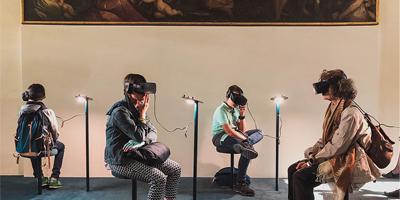How virtual reality is being introduced into the Scottish legal system

Open Justice Centre Intern Teah Zdanowicz writes about the Scottish Government's new project to use virtual reality technology in courts.
In April the Scottish Government announced that in a world first move, virtual reality headsets will be used to help victims and witnesses familiarise themselves with giving evidence in court. This pioneering new initiative hopes to ‘allay fears and discomfort around the process’ (1) by making use of the new global phenomenon of virtual reality tech. The new project will be introduced to victims and witnesses before giving evidence in court. The users will be able to ‘walk through’ the three-dimensional court which will display videos of the court where their case is being heard. This new software will allow people to not only tour the court, but crucially to interact with the people and objects they can expect to encounter in courts.
The project is a collaboration between VVS and technology provider Immersonal and CivTech, the world's first successful public sector innovation accelerator, which has delivered a working prototype for Glasgow's High court and Sheriff court. The new project will continue to be expanded over the course of next year. The project will be overseen by Victim Support Scotland, whose volunteers will be able to support victims and witnesses as the experience the virtual courtroom environment. Although with the use of this new technology individuals will not need to come to court before their case is being heard, they will still have the option to do an in-person court familiarisation visit. (2)
Alongside the funding provided by CivTech of £393,000 the Scottish Government also committed to giving the project a further £131,000 to see the project be brought to all 52 criminal courts in Scotland. The first steps of the project are currently being implemented by both Victim Support Scotland CivTech.
Cabinet Secretary for Justice and Home Affairs Angela Constance said:
“We continue to put victims at the heart of the criminal justice system, their needs are an absolute priority. However, victims and witnesses can naturally find giving evidence a daunting prospect. This unique project, using innovative technology to support and prepare victims for attending court, could prove transformative.
“It has the potential to reduce anxiety and additional trauma, and also reduces the need to travel often long distances for victims to familiarise themselves with a new environment before experiencing it ‘in real life’. We hope that this will reduce re-traumatisation and anxiety, supporting victims to give the highest quality evidence.”
Often when someone is the victim or witness to a crime, we often assume that the trauma ends there. However, many victims and witnesses often state that the court and justice system experience traumatise them further or was worse than the crime itself. Trauma effects people in different ways, which will in turn impact on their ability to provide evidence in court. Often one of the most traumatic experiences is having to recall the events to the police or while giving evidence in front of a jury. Due to the nature of the justice system, it is challenging to remove all possibility that someone is retraumatised. However, changes are being implemented throughout the various legal systems in the UK to promote trauma informed services which lessen someone of the negative experiences. For example, the Scottish Government has proposed a new Victims, Witnesses, and Justice Reform (Scotland) Bill which aims to ‘create a framework to embed trauma-informed practice across the justice system and support a cultural shift towards trauma-informed ways of working’. (3)
Court familiarisation visits provide victims and witnesses with the necessary support prior to their case being heard. Victim support Scotland figures show that in the year 2021-22 Victims Support Scotland carried out 785 court familiarisation visits (4). Using new technology can help provide new trauma informed court familiarisation and reduce the stress associated with giving evidence in court. Attempts to reform the system to be trauma informed will only increase just outcomes. The use of virtual reality in this new project demonstrates how technology can be leveraged in an innovative manner to support victims. Once the project has been fully integrated into the Scottish justice system it will be interesting to find out how users find this technology and how it compares to in person visits to the court.
Reference list
- Scottish Government ‘Virtual reality helping victims’ (Published 14 April 2023) Available at:Virtual reality helping victims - gov.scot (www.gov.scot) (Accessed 28th of June 2023)
- Turner, Graham ‘Scots Gov to Use VR to Help Victims Through Court Process’ DIGIT news. Available at Scots Gov to use VR to help victims through court process (digit.fyi) (Accessed 27th of June 2023)
- Scottish Government ‘Victims, Witnesses, and Justice Reform Bill: factsheet’ (Published 19 June 2023) Available at: Trauma-informed practice - Victims, Witnesses, and Justice Reform Bill: factsheet - gov.scot (www.gov.scot) (Accessed 30th of June 2023)
- Victims Support - Annual Report 2021 – 22 pp11 (Published 2022) Available at: VSS_Annual_Report_2022_proof_06 (2).pdf (Accessed 30th of June 2023)
.jpg) Teah Zdanowicz
Teah Zdanowicz
Law School alumni Teah is currently interning with the Open Justice Centre, focusing on legal technology.
